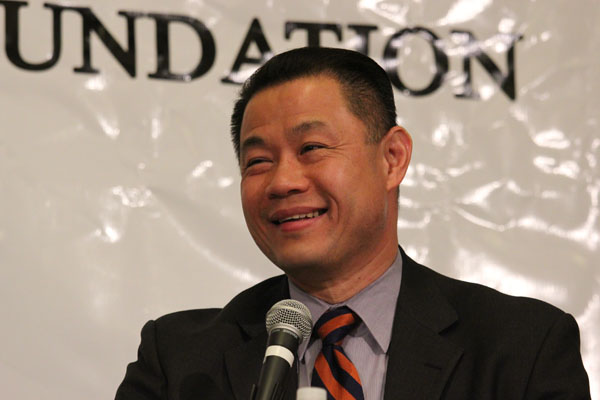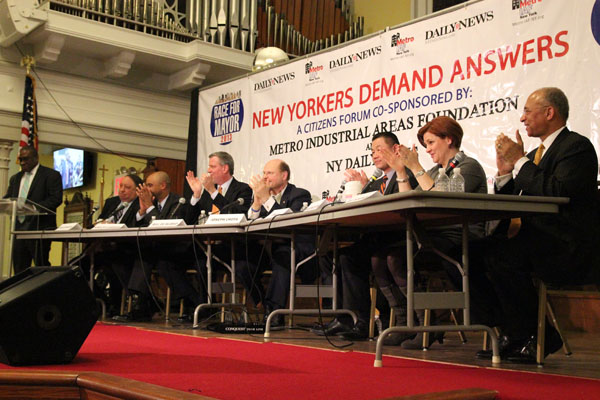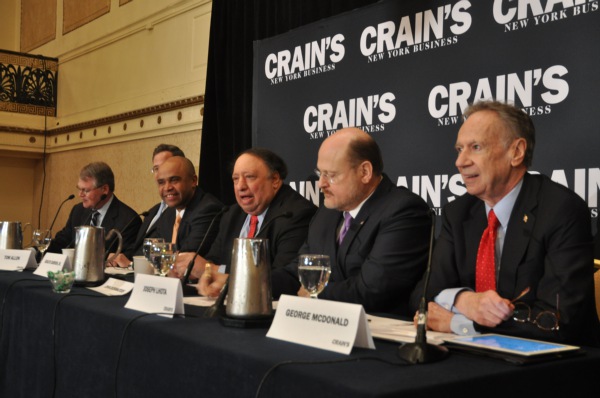John Liu Is Favored At Mayoral Forum On Public Safety

NEW YORK — Comptroller John Liu appeared to win the popular vote for mayor at a candidate forum on public safety in Queens last night.
Liu, the latest Democratic candidate to officially announce his candidacy, got some of the loudest applause from the crowd as he reaffirmed his opposition to the New York Police Department’s stop-and-frisk crime reduction strategy.
Liu has said he would end the policy on day one, if elected mayor.
Stop-and-frisk is the focus of a federal trial that got underway earlier this week. In the class action lawsuit, the plaintiffs have argued that the NYPD unlawfully targets blacks and Hispanics with its policy of stopping, questioning and frisking people on the street.
Liu said stop-and-frisk should be abolished.
“There’s a cost in the humiliation that young black and brown men have to suffer,” he said at one point during the forum. “And, of course, there is a cost to taxpayers. We can do better and we will do better.”
Raheem Harley, 54, a local barber who works across the street from the church in Jamaica where the forum was held said he agreed with Liu. “You get much more in life by using honey rather than vinegar,” he said.
Sherri Kaughman, 49, who works for the Department of Social Services, also spoke well of Liu. “He’s on the line with the people in the community,” she said.
The latest in a round of mayoral forums, hundreds of New Yorkers packed First Presbyterian Church to hear seven top candidates including Council Speaker Christine Quinn and Republican nominee Joe Lhota discuss crime and public safety. But it was stop-and-frisk that got most of the attention.
While Liu took the most aggressive stance on stop-and-frisk, rival candidates stressed the importance that a good relationship between police and the community can have on improving policing tactics and lowering crime rates overall.
Though the majority of the audience Tuesday night appeared to favorite Liu, some still weren’t 100 percent sold on the candidate but said that the event helped move them closer towards a decision.
John Rodriguez, 49, said he cut his list down to four candidates — Public Advocate Bill de Blasio, former Comptroller Bill Thompson, Quinn and Liu — after attending the forum.
“These events are great because they give you an opportunity to actually see the candidates in person, candidates that you might have only heard or read about in the newspaper,” Rodriguez said.
Liu, who currently ranks last out of the four Democratic candidates, according to a recent Quinnipiac University poll, needs every vote he can get. A federal investigation into his campaign’s fundraising, including the arrest of two aides, may also have hobbled his prospects.
But Liu was the by-and-large the audience favorite of the night, and even some of the youngsters in the audience were cheering him on.
“I think tonight was a big deal at refreshing our mind of what’s going on in our community, but also all over the city,” said Jahkai Smith, 11, a fifth grader at P.S. 13 in Brooklyn who recently participated in a stop-and-frisk panel at his school with the Amsterdam News.
Sharron Kennedy Frost, a teacher at P.S. 13, said that even some of her fifth graders have been stopped and frisked. She brought Smith and two of her fellow fifth graders — Reinaldo Bermudez and Kayla Smith — to the forum “to be aware of the candidates and their positions.”
“These kids are going to make decisions for me later on in life so I want them to be in tune,” Frost said. “They wanted to speak and ask questions, too.”
__
Image of John Liu by Emily Field/CUNY.
The Future Of Stop-And-Frisk Debated At Mayoral Forum

NEW YORK — Whoever takes the reins from Mayor Michael Bloomberg will have to reconcile the city’s historically low crime rates under Police Commissioner Raymond Kelly and his department’s aggressive, often divisive tactics.
At a mayoral forum on public safety in Queens last night, seven candidates wrestled with the legacy of Kelly's department, answering questions from the public about stop-and-frisk tactics, the surveillance of Muslims and the creation of an inspector general to independently monitor the police.
City Council Speaker Christine Quinn was the only candidate to raise her hand when the moderator, Errrol Louis of NY1, asked if anyone would keep Kelly in his job.
“I have often said Ray Kelly has been an outstanding police commissioner. He’s taken crimes to lower rates than we ever imagined possible,” she explained as the crowd booed her. She later added: “I don’t think for people to work together you have to agree on everything.”
Quinn said that she supported legislation before the City Council to create an inspector general who would monitor the NYPD and have subpoena power — a proposal that the police have flatly rejected as unnecessary because of various levels of oversight already in place.
Related: Questions For the Candidates
She said she is confident the Council will approve the measure, co-sponsored by Councilmen Jumaane Williams and Brad Lander of Brooklyn, next month.
“You can have a lot of entities, and if they’re not getting it done, then we need more agencies,” she said, emphasizing that “systemic change” at the NYPD is necessary.
Rival candidates Bill De Blasio, a Democrat, and Joe Lhota, a Republican, disagreed that the solution to policy challenges at the NYPD, particularly stop-and-frisk, was the creation of a new office.
“I think building another bureaucracy on top of this problem of stop-and-frisk is not the right answer,” said Lhota, a former deputy mayor under Rudy Giuliani who quit as chief of the Metropolitan Transportation Authority to run for office.
De Blasio said that stop-and-frisk could be reformed and that police shouldn't be making stops based on a quota system, which has been one allegation surrounding the policy.
"We need to send a message to every young man of color that they are beloved, they are valuable, they are our future," he said. "You can't do that if you're constantly treating people as suspects."
The crowd at First Presbyterian Church in Jamaica, Queens, seemed to cheer loudest when candidate John Liu, the city’s comptroller, spoke out against the practice.
"This is the largest system of racial profiling going on anywhere in America," said Liu, the most recent Democrat to officially announce he’s running. He was the only candidate to say he would abolish stop-and-frisk if he were elected.
NYPD data shows that nine out of 10 people stopped in 2012 were black or Hispanic men, and that the vast majority — 89 percent — were innocent. A federal judge began hearing a case Monday that could lead to the reform of the NYPD’s stop-and-frisk policy and the appointment of a monitor to oversee changes. The NYPD has argued that the strategy saves lives and reduces crime.
Related: Liu The Most Popular At Forum?
Last night’s forum was the last of three mayoral forums hosted by the New York Daily News and Metro Industrial Areas Foundation, a network of religious institutions, schools, senior centers and homeowners assocations.
Voters asked tough questions and said they would hold the eventual mayor accountable.
Moderators selected eight local voters to ask the candidates about their thoughts on crime and safety.
Brandon Gibson, 27, a leader with the Hope Christian Center of Brooklyn , claimed he had been stopped and frisked by police more than 20 times and asked the candidates if they had ever been stopped-and-frisked. The answer was a unanimous no.
Bill Thompson, the city’s former comptroller and one of the four Democratic candidates for mayor, told a story of how he explained stop-and-frisk to his 15-year-old son, but when Liu asked Thompson to join him in calling for an end to the practice, Thompson grew animated and pounded his fists on the table.
Thompson said he would be the one to worry about parenting his son.
Republican hopeful John Catsimatidis, a billionaire supermarket magnate, said he would keep stop-and-frisk as is, though the crowd snickered as he floundered on the topic. After the debate, he said an imaging device would help police tell if a person is carrying a gun, and stop-and-frisk will eventually be unnecessary.
Most of the candidates discussed a proactive strategy that changes the relationship between the police and the community.
“We need to restore a community policing model that gets police officers out of the SWAT cars and walking the residential streets in our city,” said Adolfo Carrion, the Independent Party candidate and former Bronx borough president. “That requires more police officers.”
Thompson suggested the city would be able to afford to hire more police officers if the NYPD would staff precinct desks with civilians.
Maribel Baez, a tenant of Melrose Houses in the Bronx, said she wanted more security in New York City Housing Authority buildings.
“These days, crime is often indoors,” Baez said. “I’m tired of risking my safety and life when I go home.”
Baez explained that elevators, lobbies and dark stairwells are common places for crimes now. The candidates said improving safety at public housing would need to be a priority of the next mayor.
“When something is broken and not working, like our education system, you need to turn it upside down and fix it,” Carrion said. “The New York City Housing Authority needs a makeover and I intend to do it.”
Quinn also promised a shakeup in the leadership of NYCHA.
Kadeem Mullings, a sophomore at Andrew Jackson High School, said he was mugged recently on his walk home from school. He asked if candidates had plans to increase safety along the routes kids walk to and from schools.
The candidates were short on specific tactics, but said again that they would hire more police officers. De Blasio said children should have access to safe after-school programs.
“We should tax the wealthiest New Yorkers so we can have after-school programs for every middle school student who needs it,” he said.
While the candidates disagreed on policy, they were unanimous in their commitment to reducing citywide crime.
“We can and must continue to drive crime down,” de Blasio said. “As we’ve gotten safer and safer, no one in this room, no one in the media, can pretend that that was evenly distributed.”
___
Image of candidates at debate by Emily Field/CUNY.
GOP Mayoral Candidates Debate Paid Sick Leave, Income Inequality

NEW YORK — Five mayor hopefuls contending for the Republican nomination debated critical issues facing the city including paid sick leave and income inequality — as well as the legacy of Rudy Giuliani — at a forum yesterday.
Each of the candidates labored to distinguish themselves while also promoting their appeal to party stalwarts as well as the overwhelmingly Democratic electorate of the city.
The participants in what was billed as the first Republican-only debate included Joe Lhota, the former Metropolitan Transportation Authority chief; Tom Allon, owner of Manhattan Media; former Bronx Borough President Adolfo Carrion; supermarket magnate John Catsimatidis; and George McDonald, founder of the Doe Fund.
The event was hosted by Crain’s New York Business, and moderated by Greg David, a columnist for the publication.
At one point, David referred to Giuliani as a “jerk.” Lhota, who served as a deputy mayor under Giuliani, took umbrage with the comment, pointing out that Giuliani had elected at a time when the city was called “ungovernable” and “unmanageable.”
After the event, he told reporters: "Using a pejorative to describe Rudy Giuliani in a forum like this is unfortunate.”
Much of the debate, though, focused on economic issues including raising the minimum wage, the paid-sick leave bill that has been stalled in the Council and income inequality.
Lhota said he didn’t think it’s the job of city government to legislate a living wage or paid sick leave at a debate yesterday.
“Our children need to be properly trained so they can work in a global economy and pull themselves up the way we have done,” he said. “It’s not the role of the city government to determine that all private business should have an HR policy and that it should be determined by the City Council.”
And he didn’t think inequality in New York was noteworthy. “New York is not any different or any worse in inequality than what’s happening in the United States of America,” he said.
Carrion, who is technically unaffiliated with the Republican Party but has been promoting himself to their leadership as an independent-minded alternative to the current crop of contenders, said inequality was the result of “a failed education system.”
Allon and Catsimatidis both proposed a tiered minimum wage, with workers 23 and under earning the current minimum wage of $7.25 an hour, and a higher wage for workers 24 and up.
For Carrion, a minimum wage requirement is not a solution.
“The living wage bill became a killer for the Kingsbridge Armory,” he said, referring to the plan to turn the long-empty Bronx armory into a mall, which failed after developers refused to agree to a minimum wage requirement of $10 an hour.
He seemingly reversed himself later in the debate when talking about renegotiating contracts for city workers, which expired in 2010.
“We have to index raises and benefits packages to the cost of living,” he said. “You can’t have a city workforce that can’t afford to live here.”
McDonald drew on his experience as founder of the Doe Fund, which provides job training for the formerly homeless and incarcerated, to argue against raising the minimum wage and mandating a paid sick leave policy.
“If the minimum wage were $50 an hour it wouldn’t make a bit of difference to a man or woman who doesn’t have a job,” he said. “At the Doe Fund, we’ve always paid above minimum wage, and our graduates get jobs that pay over $11 an hour. Why do we need government to create an artificial wage?”
All the candidates agreed that the next mayor will need to fix the city’s education system.
Lhota, who left his job running the MTA to run for mayor, noted that the city’s education budget doubled in 10 years with little improvement in test scores.
Allon called for better teacher training and retention. “Fifty percent of teachers leave within five years,” he said. “We are committing educational malpractice by allowing our teachers to leave so quickly.”
Catsimatidis proposed vocational training for high-school students.
New York City property taxes drew universal condemnation.
Lhota said the biggest problem with the current tax system is lack of transparency.
“No one has any idea as to how the assessments are being done,” he said. “The Department of Finance is told how much they have to generate by the Office of Management and Budget, and then they back into the number.”
Allon and Carrion suggested that tax assessments were unfair to outer-borough property owners, but stopped short of calling for higher taxes.
“It’s not fair that people living in buildings on Park Avenue pay less than people in outer boroughs,” said Allon.
Carrion, who has a home on City Island in the Bronx, said his parents’ property taxes on their Rockland County home are six times his.
In closing, the moderator asked each candidate to explain his Republican credentials, but referred to former Mayor Giuliani as a “jerk.” In response, the candidates took turns praising Giuliani’s legacy.
Lhota said his experience in the private and public sector gave him an ideal background to build on “the transformation of New York City that started with Rudy Giuliani.”
“We need to be fiscally conservative, we need to try new ideas, we need to be socially progressive,” said Lhota. “It’s out of sync with the national Republican Party, but after all, we are New York City. We are always leading the charge forward.”
Allon, who changed his affiliation from Democrat to Republican in October 2012, touted his appeal as a “fusion candidate.” Allon, who has been endorsed by the Liberal Party, said Giuliani’s 1993 victory margin came from Liberal Party voters.
But he was not the only candidate promoting crossover appeal.
Catsimatidis also said he could appeal to constituencies from both parties, saying “a pure Republican cannot win in this city.”
“I’m probably one of the only candidates running for mayor that can sit down, put my arm around both sides and make a deal, he said.”
Carrion, who is running with the backing of the Independence Party which helped Michael Bloomberg to victory in the last election, said he was frustrated by the partisan gridlock on the federal and state level, and that his ideas square with the Republican platform.
“I am a social progressive, which makes a northeastern Republican. And I’m a fiscal conservative, which makes me a northeastern Republican,” Carrion said.
In an audience poll, 63 percent said Lhota would be most likely to win a general election. Catsimatidis came in second with 20 percent, and McDonald with 10.
___
Photos by Irina Ivanova.




